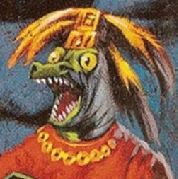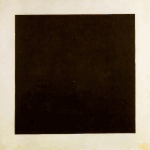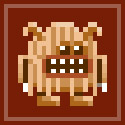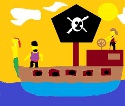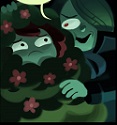|
CodfishCartographer posted:I've always wanted to play Eclipse and Twilight Imperium, but holy poo poo those time investments. I was thinking the player board would be a little more literal with the player cockpit. You buy sensor systems? It's a new board you slot onto the side of your player board. Upgrade that sensor system? Slot on another new board onto the sensor systems (or maybe remove a piece of the previous board to reveal a new aspect of the system). So your player board will look different every game as you upgrade different ship aspects. I'd imagine each one would be a Space Cadets-style minigame sort of thing. I prefer Twilight Imperium over Eclipse. My thinking being that if I'm going to play the most rediculous space 4X tabletop ever made, I want absolutely everything that TI offers. I like what you'ver proposed here. I've been mulling around ideas to adapt the combat of F.T.L.: Faster than Light into a tabletop for a while with minimal success.
|
|
|
|

|
| # ? Apr 27, 2024 04:12 |
|
You might be interested in what Donald X. Vaccarino has written about creating Dominion and its expansions. He's really thoughtful and articulate about the design process and also good at separating which things are more about the game in some sort of ideal sense and which things are more about practicalities like the cost of printing playing cards.
|
|
|
|
stoutfish posted:So I had an idea for a board game, thought about it more and realized it would work better as a video game. This made me realize that through my limited experience with board games I don't really understand the core of board games. So I want to ask you guys what board games would help me understand what makes board games tick? A game I can reverse engineer and think "This mechanic was implemented like this for x reason and works most optimally for board games." This book may interest you.
|
|
|
|
CodfishCartographer posted:So I was rewatching the SU&SD review for Mage Knight, and they pointed out how the player board is like a cockpit of your own personal fighter jet. That does sound like fun. One idea I had off-hand was the idea of assembling an increasingly complicated machine out of different decks of cards. Each one has a certain number of cards in it, which are flipped each turn. Each turn the requirements you have to hit for the deck to work increases. Each deck is stacked on each other. So if something goes wrong in your first flip that mistake cascades down the line, making each attached requirement more and more difficult. Each turn you add a new deck in, and then flip the top card of each deck you already have. The goal is to be the person who is able to accumulate the most successful trips down their chain of decks without catastrophic failure. That probably seems really vague, but I can see possibilities for it in my head.
|
|
|
|
So, here's an idea that I've been working on that I think has promise. It's set in an American high school, with each player acting as a teacher in a different subject. Each teacher has a given number of students (my current number is 5, but it's malleable) that bustle between classes, and it's your job to get all of them taught the stuff they need to know. Each day, you'll devise a lecture plan consisting of up to three cards. You have three Lecture slots, and each card has a listed length. Thus, you can use one really good card or three sorta good cards to mix and match. Simply put, you'll run one class through your lecture, then you'll pass your students around to the other players, then run it again. After four different classes where you've taught every student once, there's a recess break that allows you to make changes based on what other players are doing. Lectures can affect each other (say, students coming out of a really stressful test won't learn as well), so you may want to change your lecture to take advantage of that. But that's not all. Once per day, you can play what I call a "Drama Card" which shakes up what happens during a class period. This can be anything from you making a spelling error to the fire alarm going off and everyone losing class time. Drama Cards are my way of making each period unique; you want to play them during a class to help specific students or groups of students improve more quickly or to interrupt a lecture that won't help this group (or will really help an opponent group). The game is structured into three quarters, each ending with a test. In the first quarter, you'll have a small deck of options that you'll draw from, and as you switch quarters, you'll add more cards to your deck. Since each player has a different subject, I'd like the decks to be subtly different to reflect the way those subjects are taught. Obviously, that'll have to be balanced and stuff, but I think it'll lend itself to replayability, since you'll want to see how the English teacher differs from the Science one. As some ideas off the top of my head, perhaps the English teacher will focus on putting students in groups that improve together, while the Science one will have lots of demonstrations and labs that take up all three slots but give more points overall. The game does have a very solitaire bent, it's true. However, I think I can make Lecture and Drama cards affect each other in a such a way that you'll need to keep watching what other players are doing and change your strategy accordingly. There's still a lot of stuff I can improve upon. My student cards are a little sparse right now, consisting of a name, a picture, their schedule, and their starting stats (which are difficult to gauge). I'm considering a "reputation" stat for your teacher that could affect... something. As I've said, I'm looking for more ways to screw around with the other players and make the game more than just solitaire. Perhaps there are other types of cards I can get into the mix. So, to summarize:
|
|
|
|
ActingPower posted:Highschool Game sketch I think you've got some really good ideas here, but also that there's a lot of room for improvement. There looks to be a lot of bookkeeping in order to track everything you want to do, not that this is neccesarily a bad thing, but it is something to keep in mind. I also think you've got too many phases in your game as it stands now, the players are going to be cycling through a lot of plays in a single round. Some easy-of-play would not go amiss. However, I think the basic premise is great and it has the chance to capture the "watch everything go horribly awry" spirit of games like Battlestar Galactica (Which is something I would encourage you to bring out. I find stress to be a great aesthehtic of play.) Let's talk about the teachers: I would encourage you to structure each of the teacher's identity's to be playable in any subject, maybe with a specialty. This would provide reply value and free up design space to have a reasonable number of options for any game. I'm trying not to draw too heavily from BSG here (I don't know if you're familiar with it) but in that game, each player has a character identity with a number of skills (i.e. Leadership 2, Politics 1, Engineering 1) and a once-per turn and once-per game ability. Something similar might behoove you, for example, a Cool Teacher could remove stress from a student, or an Old Stickler could add stress but also up a grade. I would keep classes together on their own boards (I'll call it a seating chart), and also reduce each to three students. (Have fairly frequent events that move students around on the seating charts.) They should have personality, in the form of a static ability and a statline, but remember that these aren't the player and need to take a back seat to the teacher's antics. I think the three-card lecture would result in too many play pieces. I might suggest instead that each subject have a "Lesson Plan" deck, with cetain criteria to raise or lower grades, and each teacher's skills provide options from related decks. (I.E. The Cool Teacher can use two cards from Projects and one card from Exams and zero from Homework, where the Old Stickler gets three Homework, and two Exams.) Consider reducing the number of lessons each player plays, and involve them in extracurriculars. Planning proms, sporting events and clubs, dealing with students going through divorces, getting into colleges, unplanned pregnancies, coming out of the closet (maybe deciding that they were hetero after all?). There's a huge amount of space for different High-School Level Crises that could involve multiple teachers. Diversify away from just having teacher's planning lessons, and have them building up the school at the same time. If the Old Stickler also ran the Gay-Straight Alliance, then the player gains numerous new avenues of interaction.
|
|
|
|
Thanks for the response! I know it's not the most developed idea, so I'm glad you have a lot of advice for me. On Bookkeeping: Maybe it's just me being a smarty-pants, but I don't necessarily have a problem with a lot of bookkeeping. In a sense, that was also part of the game: as a teacher, you have to keep track of all of your students and their grades. It's a lot to keep track of, sure, but that's what being a teacher is about. On Too Many Phases: I guess? It's three phases of multiple phases of two phases of four phases. If that's too confusing, then I could probably simplify it. For example, I was thinking that there's no need to make everybody go to the second quarter at the same time, so perhaps once you play your test, you immediately draw the next set of cards. That would also mean you'd want to play your test as quickly as possible, but if you play it at the same time as another player, then you'll both get worse scores. Playing chicken, essentially, or the Prisoner's Dilemma. On Teachers: So are you saying, instead of having English and Science teachers, you'd have Cool teachers and Smart teachers? Or are you saying, after you pick your subject, you also get a role (so the Cool English teacher, or the Sporty History teacher)? That's an intriguing idea, but isn't that only making it more complicated? On Class Rotation: I'm disappointed that you didn't like the rotation mechanic. That was one of my guiding mechanics, one that I thought would create player interaction and motivate you to focus on each student in each class period. I know that it might be a bit tedious, having to improve each student each time they switch from class to class, but that's why I implemented the Drama cards: to give each period some variety. If that really doesn't work, then I guess I'm back to square one. (Or maybe I'm not following you, and your idea is more similar to my original vision than I'm understanding. I really need more cards so I can simulate a game!) On Students: I agree that 12 is better than 20 (or 3 than 5, if there isn't any rotation). So besides the statline, you recommend a static ability of some kind? I'm not totally sure what that would be, but I suppose it makes sense. Like a role card again. On Three Card Lectures: As I mentioned in the first post, the point of three card lectures was to allow some level of customization. You could play this card, but it takes up two slots instead of just one, so you can't do as many different things that day. A test takes up all three slots, meaning you can't do anything else that day. But what you said led me to an interesting idea: Instead of time slots, what about combos? If I have certain types of lessons in my hand, then I can play them together and make my lesson longer. (E.g. doing a prelab followed by the lab itself in Science, or talking about rhyme then assigning poetry homework for English.) On Extra-curriculars: An awesome idea, and one I was considering adding. There would have to be, what, special cards just for that? Or make it some kind of worker placement thing, where if you help with the Prom Planning Committee, you get certain benefits, or you can help with the track team and get some other boost? As to Super High-School Level Crises (I see what you did there), that was going to be in Drama cards. Dating, bullying, mental instability, etc. In the future, I could have imagined sending kids to such places as the infirmary, detention, or remedial classes, just to really screw with the whole system. On Diversifying: I like the concept, but how will the execution go? I mentioned worker placement up there, but in a sense, that's what you're recommending, isn't it? Make the teaching just one small segment of the actual game. Unfortunately, I am not a teacher, so I don't know what else to add, tbh. I can see how having one of my students and one of your students in the marching band can help us interact, but I don't know how that mechanic gels with the teaching aspect. In case it isn't apparent, I'm very grateful for your comments (especially since my last idea didn't get any comments and then quietly died once I realized it was fundamentally flawed [not that I'm bitter]). I'm glad you're pointing out things that don't work; I'd hate to get any farther on a bad concept, stitches in time and all that. Do you know if there are other board games where you play as teachers or students? I could probably draw concepts from them. (Or maybe there aren't, and my idea is as unique as I thought it was!)
|
|
|
|
Personally, I like both of the disputed ideas - the three slot system and the rotating students. With the three slot system, you have quite a bit of room for creative card interactions. Have a card give extra / less points depending on its position (first, second, third) in the lesson plan. Have a card that increases the reward of the next card in the lesson plan. Have a card that has less strict requirements if it's the first in the lesson plan. Things like that - get creative! Those interesting card interactions will help make each deck feel more unique, will help players feel smart when they setup awesome combinations. As for the rotating students, I think it's a good idea because then it gives more player interaction - if indirectly. Say Player 2's first lesson in his plan requires a low level of student stress to gain a reward. Player 1 could see this, and then make her last lesson in her plan add a high amount of stress - so when the student goes on to Player 2's class, the reward will be lowered. After recess, you could have the direction that students rotate change (in this example, then the student would go from Player 2's class to Player 1's). If each player adds their lessons to their plan one at a time (everyone adds their first card, then their second, then their third) then it could allow players to plan around each other's strategies. I like the idea of having teacher personalities, if only to give more options and play styles. Each teacher having various stats and one ability could work, because then it adds for some more interesting choices and strategies. Say you have a Cool teacher which has the ability to lower the stress of one student each period, but the teacher has a relatively low IQ score. If you play a lab card, you might get a slight penalty for not meeting the IQ requirements but could lower a student's stress to the point where you could get a big bonus from that lab. Bookkeeping is generally not a great idea for board games. YOU may be able to keep track of everything in your head, but other players won't. T more you can get into physical pieces, the better. Teachers have a lot to keep track of, yes, but you want players to need to keep track of the gameplay and the other players (if i put this down, then it'll give me a bonus to this, but Player 1 has that card that can hinder me, so do I want to risk it? do I have something that can gently caress over player 3? poo poo, which student will work their way to my class at that period? will they have enough IQ to pass this lesson?) rather than trying to remember how to run the game itself (poo poo, how much stress did you add to this student? wait, do we rotate again, or is it recess time?)
|
|
|
|
I'm debating between a few different setups for combat in a card/board game that I'm working on. In different card games there are various states for unit cards to be in - in Magic a creature is either alive and fine or it has taken lethal damage and is sent to the graveyard, in VS a hero is either Ready, Stunned or has been KO'd & in the WoWTCG your Ally cards take damage which builds up over turns until they are destroyed. I'm trying to find the scheme which works best for my own game, which has a focus on position based tactics and unit to unit (and unit against player) attacking and defensive actions. Basically each player has 2 rows with 3 slots in which to play their unit/monster/etc. cards, and depending on their position they can be used for either Attack actions against enemy monsters (or the opposing player) or to Intercept incoming attacks made against the player (but not attacks made against other monsters). If a player has no monsters in one of their 3 columns they have a Breach in their line that the enemy can attempt to attack through, but monsters which have a clear line to the Breach can Intercept attacks made against the player. Here's a crude diagram: 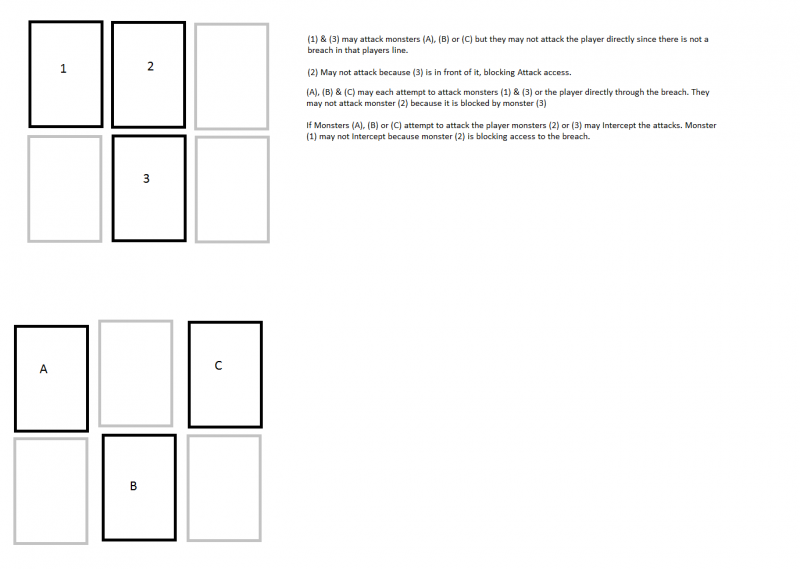 I'm trying to decide what would be a good way to have the unit statistics set up - the three systems used by the other games I mentioned above all have their own merits - Magics is incredibly simple with monsters being cleared off the board immediately upon death and no extra book-keeping involved, VS (and Doomtrooper for that matter) had a setup where you had to deal 2 lethal blows to a unit to take it out permanently and allowed them to stick around in a Wounded/Stunned state which is a bit more forgiving than Magic to the defending player and still leaves some options open for healing/restoration & WoW's incremental damage setup allows numerous weak units to take down large/powerful enemies with coordinated attacks, which I think is a pretty interesting dynamic (and also leaves room open for healing units). I'd appreciate any input from CCG/LCG/etc. players on what they think the best way to proceed would be.
|
|
|
|
|
I remember, when Magic was first being introduced, how confusing people found the damage system. Now it seems pretty normal. One beauty of the Magic system is the way it creates thresholds, which in turn make the design space more interesting. Sometimes a 2/3 and a 2/2 are about equivalent, while other times the former is useless while the latter is pretty good. In a persistent damage system, the effective differences often become much more linear. The Magic system allows interesting swings in game play, and makes the design space more rich and varied. Tactical card games are absurdly common right now among designers (though very few have been successful). I've played probably 20 in the last few years, and I see 5 or 6 more in the pipe on Kickstarter at any given time. Almost all have: persistent damage, fewer card types than Magic, deterministic costs (via, for example, predictable mana), and no "instant" effects (making the rules much simpler). There's been some OK ones, but they're mostly pretty mediocre; often they just don't have the design space to be interesting. I'm not saying don't make a game like this, but, er, yeah, that's kind of what I'm saying I guess. I think you'll need a really crazy new idea to make something at all interesting in this space.
|
|
|
jmzero posted:I remember, when Magic was first being introduced, how confusing people found the damage system. Now it seems pretty normal. One beauty of the Magic system is the way it creates thresholds, which in turn make the design space more interesting. Sometimes a 2/3 and a 2/2 are about equivalent, while other times the former is useless while the latter is pretty good. In a persistent damage system, the effective differences often become much more linear. The Magic system allows interesting swings in game play, and makes the design space more rich and varied. I don't really think I have anything super innovative here - I just want to have a solid framework that can create potentially fun/interesting gameplay scenarios and encourage skillful play. I know I'm not making the next Magic, I just want to see if I can get something together that will manage to rise above mediocre with some polish. Thinking about it some more I think I would go with the Doomtrooper setup of having an ATK and DEF stat on each unit card than then doing simultaneous ATK/DEF comparisons between combatants which result in Wounding. It allows your units to stick around a bit longer but it doesn't require keeping track of a large number of damage tokens and makes it so that you can have a decent amount of variety within the units (powerful attackers/weak defenders, balanced, weak attack/strong defense) as well as abilities that key off of the Wounding mechanic. Honestly I'm not ashamed to admit that a lot of this game is made up out of mechanics from other games that I thought were great - for instance the shared turn system of the VS System is one of the best ideas in card games period and the fact that almost every other game uses a "Player A to Player B to Player A, etc." standard turn system when an idea that amazing exists is pretty sad. Bob Quixote fucked around with this message at 15:49 on Mar 31, 2014 |
|
|
|
|
So I finally got some playtesting done on my monster hunter board game with my group. Things went really well - there are definitely changes that need to be made, but overall the group was having fun and were all very engaged with the game and the decisions they were making. I've already got ideas on how to fix the problems, and will be making a print and play version for everyone else to try out. I'd give a time frame on when to expect it but since that never seems to work out well, just expect it to be "soon". I'll have a mockup of the rule book out "sooner than that" hopefully.
|
|
|
|
Bob Quixote posted:I don't really think I have anything super innovative here - I just want to have a solid framework that can create potentially fun/interesting gameplay scenarios and encourage skillful play. I know I'm not making the next Magic, I just want to see if I can get something together that will manage to rise above mediocre with some polish. I'd actually encourage you to make the game you want to make. Magic seems like it has major innovations because, twenty years on, we've studied all of the good design that went into it. And, in fairness, it executed a lot of its ideas exceptionally well, but that doesn't mean that it wasn't derivitave of its predecessors in some ways (chiefly RPGs to be sure, as can be seen in its earliest card design.) In regards to your inquery, are you familiar with The Spoils? It's a blatant M:TG knock-off made by M:TG tournemant players that wanted the game to work their way. It's not for me, but its not without some good ideas either. Their creatures have three stats, STR, DEF, and SPD; faster characters deal damage and can kill slower ones before taking a hit, which does add some variety to combat. One suggestion I'd make to you is to consider what's being represented by the playing pieces. Magic 'duelists' tend to be pretty utilitarian about their creatures, they're there to serve and die at your leisure. Pokemon obviously is more concerned about the back-and-forth between creatures because they are more important to the narrative of the game. (This is admittedly a bad example, since Pokemon aren't getting too badly roughed up but it might be interesting to consider a more invested view of a players units rather than just as mooks to be traded with the opponent.)
|
|
|
|
Edit: Rethinking.
Imagined fucked around with this message at 22:05 on Apr 2, 2014 |
|
|
|
I particularly like the ideas you have about e.g. no hit points or player levels per se - it's intrinsically handled by being further ahead or behind on the board. I also like having to escape the Dungeon. Sounds like some good design has gone into this, I'd give it a try. Are you planning to prototype it up? Just thinking out loud? I'd also totally print and try that Monster Hunter game. I love trying new games and seeing all the different angles and thought that went into them.
|
|
|
|
Mister Sinewave posted:I particularly like the ideas you have about e.g. no hit points or player levels per se - it's intrinsically handled by being further ahead or behind on the board. I also like having to escape the Dungeon. Sounds like some good design has gone into this, I'd give it a try.
|
|
|
ZorajitZorajit posted:I'd actually encourage you to make the game you want to make. Magic seems like it has major innovations because, twenty years on, we've studied all of the good design that went into it. And, in fairness, it executed a lot of its ideas exceptionally well, but that doesn't mean that it wasn't derivitave of its predecessors in some ways (chiefly RPGs to be sure, as can be seen in its earliest card design.) I've been thinking more on the representative side of things and I'm seeing the monster/creature cards being in a spot somewhere between disposable Magic mooks and essential/harder to kill units depending on the resource investment cost or abilities of the particular unit. You could have cheap low cost guys who are only really there to tie up the other players heavy hitters and possibly allow your own powerful units to get through their defensive line. Ideally every step of the players shared turn would have tactical implications that could swing the course of the fight right from the beginning of the game - from the placement of resource cards on the board, the location that units are played or moved to, the order that attacks are declared and any cards played to modify the turn. Something that isn't terribly complex in terms of rules memorization, but which would have a lot of variety between games. Its a hard sweet spot to hit and I'm still a bit away from saying that I've successfully done it but I enjoy putting the effort in and seeing how the playtests come out.
|
|
|
|
|
Over the weekend I pooped out a very simple Plants vs Zombies board game with my kids (they did cutting and coloring). They're just messing with the pieces in the picture, but they took to the actual game pretty well. It's a simple tower defense game, with very limited options each turn, but rewarding some co-operation (the Sunflower is good at making sun, the Peashooter is good at spending it to shoot zombies, the Cattail makes Walnuts to stall, etc..). Being 3 (and, uh, active) I was kind of surprised how well they picked it up - though I suppose some people teach their 3 year olds Chess (and this isn't exactly Chess).
|
|
|
|
That is incredibly awesome, you are a cool dad.
|
|
|
|
Last year Cards Against Humanity held a board game design competition and they decided to make a web series out of it, which is finally airing. It is very interesting from a hopeful game designer's perspective. I made a thread for it if you want to follow along: http://forums.somethingawful.com/showthread.php?threadid=3622572
|
|
|
|
I've spent most of the Tabletop Day toying with a deck of cards and emerged with a little game prototype that looks quite promising. It is themed around players leading competing fantasy-ish Thievies Guilds and is basically 7-card brag with bells and whistles. Each Guild consist of four Gangs, which are single suits of traditional french deck. Where they differ is in the face cards, which are veteran members* who grant various special abilities - some passive, doing nice things when they're part of a set and some active, simply played for an effect. The gangs can be mixed and matched, drafted, bid on, whatever - as long as they end up in a proper four suit deck. (I hope keeping it to only three abilities per gang will help keep this manageable for me) The goal of the game is to accumulate more money than the other players. Each round players draw seven cards from their decks and lay down three big Heist tiles. They take turns sending their goons (cards) to places they want to rob (face-down) or playing the veterans with active abilities until everyone passes. Each Heist is resolved in order and the guild with the strongest set of cards grabs the loot - getting the job done before the others. You can have up to three cards at a Heist and the sets are ranked as in 3-card brag, but you players can commit only one or two cards if they wish - they might be strapped for cards, but still willing to risk a pair/high card or just want to drop a face cards with a cool passive ability to mess with others. In addition to a loot value, each heist will probably provide some minor ability to steer certain gangs toward it, but I'm not touching that until the gangs themselves are alpha-finished. This is prone to punishment in the City Watch step, though. After resolving a Heist, one or more cards (depending on the heist itself) are drawn from the city watch deck, with players drawing additional cards for Heat tokens they've accumulated. If the City Watch has a higher hand than a player he is busted and forced to cough up bribes for the force. Face cards are the Sherlock Holmeses and Philip Marlowes that subtly mess with expectations if they find they way to the set. Please take my word that this is less random than it sounds - it takes some heat to be threatened at all and even more not to be safe with a mere pair. Heat can be acquired in a variety of ways, such as paying for particular card effects or having a run-in with a named watchman. Players can skip a round to lay low and lose all their heat. As for the gangs themselves (they will have proper names): Clubs are the gangs used to gently caress with other players. - Greenskins use force and intimidation to push out other guilds, going directly at their hands of cards. - Bent watchmen manipulate heat in their favor and totally have nothing to do with all the anonymous tips the commissioner receives. - Halfling burglars and cutpurses abhor violence and go straight for the money. This could end up as an annoying game extender, like Dominions witch, but I intend to give each gang a particular angle - for example Greenskins like to discourage others from spreading out (the holy grail of depriving someone of two cards would make it technically impossible to make two full sets!), while the dirty cops want to corner the market of spreading out with impunity. I intend to tweak the halflings as a response to going all-in on a most valuable heist. - I'll have to tread lightly here, but I intend the fourth clubs gang to be assassin-themed surgical card removal, or perhaps even narrower face card removal. I personally love control decks, but I know how annoying and unfun they can be at times. Still, I probably won't touch it until I establish all the cards actually worth sniping. Spades are gangs centered on card manipulation. - Ratmen just keep crawling en masse out of sewers and God knows where, represented by drawing extra cards. - Doppelgangers are Deja Vu personified, imitating goons seen before (and now chilling in the discard pile). - When life give you lemons, make a chop shops. Necromancers mix'n'match some body parts to tweak goons in your hand into just what you need. It's a bit tricky and costly though and suited mostly to the "one big heist" approach. - There's also a gang centered on stacking the decks for coming draws, but I have no loving idea what this means flavor-wise. A wizard did it, I guess. Diamonds are misc buffs I guess. - Dwarven financiers are shadowy puppet masters aiming to maximise their profits no matter what risks or costs it takes. They do poo poo like "This heist? Oh, it's my joint so you'd be stealing from my purse actually, but if I rob it, it'll make for a magnificent insurance fraud". - The Lost Heirs of Elven Kingdom are actually a band of confidence men, excelling in bluff-based trickery. - The corniest fantasy crime trope of all time: the all-knowing beggars' guild, peeking at cards to make more informed guesses. - The fourth diamonds gang is not developed yet at all. Hearts are also not developed at all. I expect it'll be more of diamonds-style gangs and when I have eigth I'll find some pattern to grouping them. I'm sort of burned out for today, but the few ideas still bouncing around my head are: - In a theme-first way, I'm amused by idea of rogue alchemists turning lead into counterfeit gold. Not yet sure how to do it in a fun way. - One yet unexplored aspect is shuffling around cards already committed to heists. It could be difficult to get right, though. - I'm really tempted, against better judgement, to have the ability to switch the heists themselves after other have committed. Perhaps in the con men gang, as a play on three-card monte. Maybe it even won't be that bullshit without proper ability to stall for this action. * I really need a more archaic term than "Lieutenant". Lichtenstein fucked around with this message at 03:41 on Apr 6, 2014 |
|
|
|
Zombie #246 posted:That is incredibly awesome, you are a cool dad. I can't wait for my boy to be old enough to play games with me. He's one now, so it'll be a while, but he already thinks my shelf of games is pretty cool to look at, and he likes playing with Go stones and stuff. (Don't worry, I watch him carefully to make sure he isn't going to put them in his mouth and choke.)
|
|
|
|
[edit] Derp, wrong thread
Lichtenstein fucked around with this message at 23:12 on Apr 9, 2014 |
|
|
|
quote:but how do you go easy on people when playing games? Purposefully sucking as a player is no fun - but picking the right game can help a lot. It's often more a game design thing than a player thing. (Edit: So I'm apparently going to write a big wall of text to nobody - feel free to ignore all this longwinded crap, everyone). Games with luck involved can make games more competitive between players of different skill; and even if they don't, they make losing less painful. The loser can happily think "I would have won if I would have rolled a 6 there, or draw my X card". Ideally, luck also keeps players "in the running", perhaps with Hail Mary type plays that are low odds but can turn the game around even if a player is way behind. It can also help when a game is less directly competitive. In some games, like say Chess, your good moves are very much in your opponent's face. You are winning because you have lots of pieces left and they have none. In a more indirectly competitive game, this can be much less stark. Like, nobody feels too bad losing Castles of Burgundy (unless they deserve to feel bad  ). Yeah, maybe you score 230 and I only scored 190 (which is actually a very big spread for that game), but we both scored lots of points. It feels like you got Gold and I got Silver, rather than you won and I lost. ). Yeah, maybe you score 230 and I only scored 190 (which is actually a very big spread for that game), but we both scored lots of points. It feels like you got Gold and I got Silver, rather than you won and I lost.The other important property here is the way "options on the board" is tied to "winning". Again, in Chess, the player who is winning has all sorts of fun things they can do, while the loser has fewer options and feels more hemmed in. Contrast that with Tash Kalar. In Tash Kalar, the winner is the person who scores the most VP through meeting objectives - not the person who has more pieces on the board. Because of that, the game is free to give a player who's behind on the board "flares", which are a catch up mechanic that lets a player with less pieces place pieces or do other stuff. One player may still be way behind and have little chance of winning (because the other player has more VP), but both players will almost always have fun stuff they can do on the board. Lastly, some games will have ways of balancing or handicapping. You can play Go across a reasonable range of skills by giving a player extra pieces to start. In other games, handicapping your strategy somehow (as you mentioned) might help - but in other games there won't be a way to do it without seeming kind of patronizing. Anyway, yeah, this is an interesting problem for designers and for players - but there are games out there that work out a lot better for this stuff. jmzero fucked around with this message at 23:50 on Apr 9, 2014 |
|
|
|
So I got a random board game idea earlier today, and figure I may as well throw ideas at the wall that is this thread in case someone knows of a similar game, or to just get input on the idea in general. The basic concept is a gold rush board game, where (at least part of) the board is divided into multiple plots of land. Each plot would have stacks of cards / tokens face-down, that hide what is buried on that land. Most of the cards could be nothing, BUT SOME OF THEM MIGHT BE GOLD!!!! Players would buy plots of land, and then over time (or as some sort of action) reveal the cards in secret. Players could then develop on the land they own to build shops, mines, etc. Essentially, a game of risk management and pushing your luck. Developing everything into one plot of land would be risky if that land turns out to be worthless, but spreading out can be just as risky as well because you won't be able to mine / develop all of them. Or you could buy up lots of land and try to sell it to other players for a high price - or convince them it's PACKED with gold, no really, you just don't have the funds to develop or mine it so you can't take advantage of the golden opportunity! Seriously you should buy it now before Other Player buys it and gets a shitton of gold! The winner would, of course, be the person with the most money at the end of the game. I'd imagine there'd be a bank players would need to pay rent to for the land, and could even borrow money. One idea I think could work well would be to allow players to spend more money than they have, so they'd work themselves into mountains of debt - classic gold rush  But hey! You COULD strike it rich! But hey! You COULD strike it rich! Really the main design speed-bump with the idea is that it's pretty prone to randomness. Trying to think of a way to make it so that you'd want to buy a plot of land even knowing it could easily bankrupt you. Having chains of plots that are connected provide bonuses could certainly work, along with different kinda of plots that could provide different bonuses (one is good for farming, one has a well, one is a good location for a store, etc) I know it's a really rough layout but I'm more just getting ideas down for feedback.
|
|
|
|
CodfishCartographer posted:So I got a random board game idea earlier today, and figure I may as well throw ideas at the wall that is this thread in case someone knows of a similar game, or to just get input on the idea in general. Your entire game premise is predicated on extremely high randomness. You either need to embrace it (ala poker) or throw out the idea completely.
|
|
|
|
quote:I know it's a really rough layout but I'm more just getting ideas down for feedback. To me, the core fun of the idea is tricking other players about the gold you've seen. Like, maybe you're out looking at a few plots, but then you have to go back to town to register your claim. If you start rushing back to town after checking a plot, someone else might just buy it blind out from under you. So sometimes you'll stay out and look at some more plots before you casually meander back. Or you just tell the truth, then try to profit in other ways off their claim or something. Anyway, I think there's something fun in there...
|
|
|
|
Good point! I think I was just second-guessing the idea because I was worried about the amount of decisions that players could make. If things are way too random, then your decisions don't matter. I think that it could definitely work by giving players ways to react to the randomness itself - the game would then come from making decisions based on the result of the randomness. I'll think some more on it and get some actual mechanics and come back. jmzero posted:To me, the core fun of the idea is tricking other players about the gold you've seen. I missed this while writing up this post, but that's a pretty neat idea as well. I like the idea of players getting to peek a bit at the plots before actually buying them, gives a bit more strategy to the randomness. I'm trying to think if there could be a way to also hint at the gold that may be there. So there could be some system that when you see it COULD mean that there's a lot of gold there, but it could be a red herring. Not sure how to work in something like that or if it'd even be worth it, but maybe it has some merit. At any rate, I'm thinking you probably wouldn't be able to "cash-out" your gold for it's full value until the end of the game. This could encourage some interesting decisions (do I sell the land worth a shitton later for the money I need NOW?) along with some hilarious bluffing of trying to convince someone to buy this (worthless) land you've spent the game developing for a massive price. CodfishCartographer fucked around with this message at 00:38 on Apr 10, 2014 |
|
|
|
CodfishCartographer posted:So I got a random board game idea earlier today, and figure I may as well throw ideas at the wall that is this thread in case someone knows of a similar game, or to just get input on the idea in general. Something I may have missed in your description, but perhaps you could have different sized stacks of cards spread across the map so you can see some plots have a lot of potential for gold but in exchange are more expensive / take longer to process. Also I could see this working as a worker placement game wherein you assign workers to either explore (peek at the top card), excavate (usable only on plots you own and costing some supplies but also giving you the top card), purchase supplies / land rights, etc. You could also make it so that you receive upgrades to your actions, like you get to peek at the top card and replace it with a random card, or excavate the top two cards. Though that may be a significantly different game than what you have in mind. Seems like a pretty neat idea you have there all in all. Anniversary fucked around with this message at 16:38 on Apr 10, 2014 |
|
|
|
I have a decent idea, and I am currently finishing off a print and play prototype to test with some friends. In the game there are combat events, that may happen between players and also between a player and a non-player entity. The game is meant to be very quick turns, so I am using dice. Dice based mechanics have a lot of advantages, in that they are quick, easily understandable(people are used to them, as opposed to cards and chips) and they are very versatile. Also my game already includes A LOT of cards so I don't want to go down that route. Currently I am using 2d6 + attack score vs Defense score. This keeps rolling to a minimum, is quick to assess and gives a decent amount of swingyness, which I want. I could go to 3d6 but that becomes more statistical, and slows the game. Are there any particular issues that I need to be aware of with this mechanic? As much as I like Arkham style 5/6 is a hit it requires too many dice, and is quite slow. I will put a summary up on here once I have finished the manual and had a couple of tests, I am quite excited about it!
|
|
|
|
Since I offered it to the RPGers I figured I'd offer to you guys too: I'm going to be running games (oh god so many games) at RAGECon Reno in June, if you have something to sell and would like me to run demo games of it I would be happy to do so pro bono (aside from a copy of the product to actually run, of course) just to get a break from running like 72 hours of Dungeon World and FAE. So, uh, I guess if you want a really small group of dorks in Reno to be briefly exposed to your game let me know and I'll see about getting it slotted in. Doomsayer fucked around with this message at 04:53 on Apr 23, 2014 |
|
|
|
I'm working on too many games right now. Currently my two big projects are: "Mrs. Bennett" a card game about being a lady of limited means during the Regency era who has daughters you are trying to marry off to the best suitors. Basically based on the novels of Jane Austen, specifically Pride and Prejudice. I don't have a lot so far. I thought each lady/suitor would have four stats mapped to the four playing card suits: Beauty/Handsomeness, Grace, Intelligence and Interest, and there would be "social events" that would map in some way to the suits (perhaps making it "trump" with some sort of trick-taking mechanic. I was thinking you'd do checks during these events to get 3 links, which would mean they get married. I also wanted to have special effects you can play to improve/worsen ladies or suitors, but I'm not sure how this works, how best to balance the cards since I don't think I can make them all exactly just as good. Probably the simplest thing would be to make it so high face have less good effects. The other problem is distribution of numbers. I feel like I probably need to have it pretty equal (like a playing card deck). Right now I've put this on hold, focusing on my other project. My other current game is Foam fight wars (Yeah, definitely working title) It's a miniatures game with combat based somewhat on foam sword fighting that uses an action-point based system like the classic Fallout. I wanted a game where the weapons all really feel different, and you have to feint your way into the optimal range of your weapon, so a halberd might have a range of 3, but it can't attack (or at least not as effectively) at a closer range. So a guy with a sword or even dagger is trying to get in close. Because of how it works I need to make the squares pretty small, so one character is actually covering a 2x2 square area. (using D&D 25mm scale, that'd mean they are 1/2" squares). I'm not really familiar with miniatures games (mostly heroclix, I did get the chance to play war I also wanted to make a game that has enough tactical stuff without being a giant complicated game like War Hammer or Hordes/War Machine. Attacking and parry attributes are based on the number of dice (D6) that are rolled. Each weapon has a guard range that when a unit moves into, through or onto a square of that range of an enemy, that enemy is "activated" and there is a bluffing mechanic. The player of the moving unit takes dice equal to their attack attribute, and the other player chooses one of the activated units and takes dice equal to that unit's attack plus 1 die for each additional activated unit. (this way, all the "attacks of opportunity" are done at once). Both sides reveal a number of the the dice (but they can't reveal all of them, they must leave at least 1). If the attacker reveals more dice, the attacker gets a free attack with the remaining dice against the remaining dice of the moving unit. (so in this case, the attacker defends with their attack attribute). If the attacker reveals fewer or the same number of dice, the attack doesn't happen. Then play continues and if the moving unit has enough action points it may attack, though only using the remaining revealed dice. I had it so the moving character used their parry attribute to defend against these attack of opportunities, but my brother suggested that I use attack instead, which I think works better. Right now I've been test playing against myself, stating up paper figures I have (assorted humans, lizardfolk in heavy armor and ratmen), but I've been sketching out ideas for the world. (I definitely want this to not be just plain tolkienesque fantasy), including an area inspired by Slavic folklore, with a bog with witches and monsters (like Baba Yaga, Likhoadka and Sirins), and probably an opposing faction (with heros like Vasilisa the Beautiful, who I'm kind of imagining as a sort of Joan of Arc/Nausicaa type character). I'm working on writing out the rules and will probably post it here for feedback when I'm done. I'm pretty bad at writing out clear rules. I'm hoping to eventually get to the point of testplays on roll20 here. edit: I'm also considering some sort of card/deck element, but I don't know if maybe that'd be adding too much stuff, but I really like the idea of adding some sort of hidden info mechanic. Foolster41 fucked around with this message at 10:32 on Apr 24, 2014 |
|
|
|
I'm a bit confused by your combat system for the foam game - So if both players roll 10 dice, and then I reveal 7 of them and the defender reveals only 6, then I attack by rolling my 3 dice compared to the defender's 4? How is the actual damage determined? Do players know beforehand how many dice each player will have to possibly reveal, or is that hidden information? How is that information hidden on the playing field? It's an interesting risk reward system, but honestly it sounds a bit confusing on paper.
|
|
|
|
quote:So if both players roll 10 dice, and then I reveal 7 of them and the defender reveals only 6, then I attack by rolling my 3 dice compared to the defender's 4? quote:How is the actual damage determined? quote:Do players know beforehand how many dice each player will have to possibly reveal, or is that hidden information? Yes, a unit's attack value (which is used by both sides in this case) is open information. quote:It's an interesting risk reward system, but honestly it sounds a bit confusing on paper. Oh, I forgot to post what I have so far of the rules.
|
|
|
|
What sort of opinions do you guys have on dice pools? In general I know that dice are déclassé because they're associated with high randomness and an enjoyable central mechanic (throwing and adding). I soooooooort of like what Elder Sign does with dice pools, but hate how random it remains (even when you do stuff to hedge it with items and spells) and how irritating it is when you miss a task because of bad luck despite doing everything in your power to make good choice towards victory. I'm working on a game centered around freeform exploration and multiple paths to victory, and was thinking about using dice pools as the main player interaction mechanic. My basic idea right now is that players build their pools out of different types of dice (maybe have D3, D6 and D8 in varying colors and types) and then have various checks that require either high numbers, or very specific numbers (like multiple of 5, multiple of 3, prime number, odd number, even number) and specific color combinations. Players take initial rolls of their entire pool, and then withdraw dice from it to meet checks. Once all dice are withdrawn, they are then able to re-roll their pools. Items, perks and special abilities will allow them to manipulate their pools in certain ways. So right now, I'm thinking that there are several possible problems with this that might make me scrap it before I even start prototyping in Table Top Sim.
|
|
|
|
So I've been kicking an idea around for the better part of the past decade, and this weekend I threw a bunch of stuff I'd crunched together for it into a text document. It's Yet Another Zombie Apocalypse game, but the basic mechanics could probably be adapted to basically anything. Players take on the role of survivors of the Apocalypse, who are trying to gather supplies and allies in an attempt to escape their city. The city is randomly generated using map tiles; each survivor is unique, starting with their own weapon, ammo supply, maximum health, and starting location. After each player has chosen their survivor, the map tiles for the starting locations are drawn from the map tile deck, placed on the table, and connected using blank street map tiles. Play takes place in days, and each day consists of four phases: Dawn, Noon, Evening, and Midnight. Players take turns in sequence, when all players have gone the zombies get a turn and the current phase ends. During each phase players may take one of a number of possible actions; Exploring the Map Tile (may only be done once per tile), Movement (enter an adjacent tile or if there is an exit from the tile that doesn't connect to another tile, you may draw a new map tile and place it), Fight, or Rest (Regain health, must be done once every four phases). During the Zombie turn, two d6's are rolled. On double 1's, Zombies do not move or attack, on double sixes all Zombies move or attack. Other wise the number of Zombies indicated on the dice act. If they are in a tile with a survivor, they attack the survivor. If their tile is empty, they move to an adjacent map tile close to a survivor. Each day new zombies are added to the map, in increasing amounts based on how many players there are, how many days have passed, and how many map tiles are on the board. In addition to the goal of escaping, each Survivor will also have their own goal to complete, and their own special trait or ability (like being able to barricade themselves into a building. There's a lot more details to hash out, and I didn't go into everything here (combat has not been fleshed out at all), but does anything jump out as entirely being a bad idea? *I'd also like to do something with players gaining points per zombie killed, which they can spend to improve their character. * Bonus points to anyone who can name the games a number of my mechanics have been shamelessly stolen from. RickVoid fucked around with this message at 18:39 on Apr 29, 2014 |
|
|
|
Sounds kinda Magic Realm-y. If so you might want to cop their "Hide" action and mechanic, it could work well. The Hide process I always thought was pretty sweet.
|
|
|
|
Mister Sinewave posted:Sounds kinda Magic Realm-y. If so you might want to cop their "Hide" action and mechanic, it could work well. The Hide process I always thought was pretty sweet. Not one I'm familiar with sadly. I'll have to look into that.
|
|
|
|
Magic Realm has days split into phases that are pre-planned secretly by the players then resolved together. Monsters "block" you (preventing you from doing anything else) if they encounter you during the day (unless you are hidden) and combat is all resolved at "midnight" (which is really just once everything else is resolved for the day). Mechanically the game completely allows for co-operative or lone wolf or even PvP play; it makes no difference whatsoever to the mechanics. The HIDE action in a nutshell: "Hide" is an action you can do. You roll a die and a 1-4 (I think) is "flip your token to the Hidden side" and 5-6 is "no change". So you can write down "Hide" as the action for one or more phases, but it's not guaranteed to work. And if it doesn't work then you still resolve the rest of the turn normally (so you might spend two phases on HIDE then set off regardless of whether you successfully hid or not - the idea being that you're unaware you didn't successfully hide.) "Follow" is also an action. It allows you to form a party and act as a guide, or to shadow someone (as long as you act first, you can FOLLOW them before they HIDE.) You could even guide people and then - making sure you act first the next day - HIDE and ditch them There is more to it but that should give you an idea. Magic Realm holds a special place in my
|
|
|
|

|
| # ? Apr 27, 2024 04:12 |
|
Mister Sinewave posted:Magic Realm has days split into phases that are pre-planned secretly by the players then resolved together. Monsters "block" you (preventing you from doing anything else) if they encounter you during the day (unless you are hidden) and combat is all resolved at "midnight" (which is really just once everything else is resolved for the day). Oh wow, I like that a lot. The possibility that someone in the group could be lying to your face and is going to betray you fits into the setting *so* well, there's always the rear end in a top hat who is only out for himself. And the concept that Zombies/Monsters prevent you from doing anything but fighting them- BRILLIANT. OF COURSE THAT'S ALL YOU'RE GOING TO DO. Now I have to go rework that chunk of my idea but oh man this is so much better. Thank you!
|
|
|











